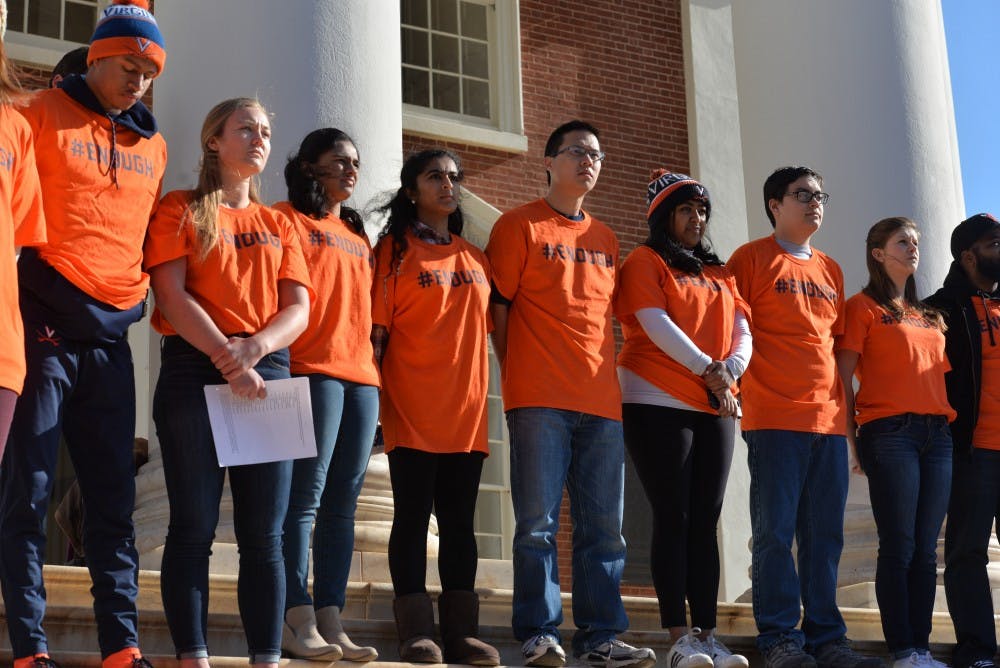Hundreds of students gathered on the Lawn on March 14, to urge lawmakers to make the current gun laws more restrictive. This walkout was part of a nationally coordinated campaign in response to the Feb. 14 shooting at Marjory Stoneman Douglas High School in Parkland, Fla. While these walkouts have driven the national conversation and demonstrated a level of solidarity unlike what our country has seen following previous shootings, especially among young people, they are not enough to enact the requested political changes of the protesters on their own.
Achieving success in political battles requires considerable amounts of unity, fortitude and determination. The current movement to strengthen gun control laws, spearheaded by the Stoneman Douglas students, has certainly shown the first two qualities. With tens of thousands of students from all over the country participating in the National School Walkout day, there is a clear sense of unity in its purpose. Furthermore, many students walked out in spite of the punishments they would receive for doing so.
What is still an open question is whether or not the campaign will continue to have such a strong sense of purpose in the weeks and months to come. It is one thing to get a movement started, but it is an entirely different thing to continue it with the sustained intensity that is necessary in order to make a change. For example, Occupy Wall Street created a spirited movement against economic inequality, but ultimately sputtered out without accomplishing its initial goal. So, when the national focus shifts to another topic, as it inevitably will, will activists continue to forcefully press legislators to pass laws or will they be content with what they have done and move on? If it is the latter, there will almost certainly be no more gun control measures implemented in the near future. However, if the former occurs, I believe that a great amount of reform can be accomplished.
While it seems unlikely that there will be any serious change at the national level given that Republicans control all parts of the federal government and that national politics has been ineffective, especially on highly-partisan issues, there is a significantly higher chance of shaping the gun control laws at a state or local level, due to the difference in responsiveness. Politicians at lower jurisdictions have smaller voting constituencies. As such, a smaller number of voters decide future election results, making each voter more valuable. Local politicians will be more responsive to a group of 20 constituents compared to a federal politician.
Already since the Stoneman Douglas shooting, Gov. Rick Scott (R-Fla.) and the Republican-controlled Florida Legislature passed a law that will enact many new restrictions on guns including raising the legal age to buy a firearm to 21, limiting the purchases and possession of bump stocks and lengthening the waiting period to buy a gun to three days. Furthermore, Gov. Scott, prior to approving this law, had an A+ rating from the National Rifle Association. This may not be an aberration either, as many other governors, including Republicans, have said that they are willing to consider new gun safety measures following the shooting. Thus, there is an opening at the state level for gun control advocates to make a meaningful push for new laws that is wider than perhaps it has ever been.
The biggest adversary to the implementation of these potential gun reforms is not the Republican Party or even the NRA. While both of these will be challenging institutional obstacles for the movement to overcome, they can be surmounted given enough pressure from those who seek change. Because of this, I believe the biggest enemy to reform is complacency. Students must continue to stand up and take action on this issue, even as other matters garner more attention. They must write letters to their representatives, call their governors and, most importantly, vote. They must support candidates that will vote for stronger gun measures and send a message to their politicians that if they do not advocate for stronger gun safety measures, they will be voted out of office. For if these actions are not taken, the current call for action will fall largely unanswered.
Gavin Scott is a Viewpoint writer for The Cavalier Daily. He can be reached at opinion@cavalierdaily.com.







